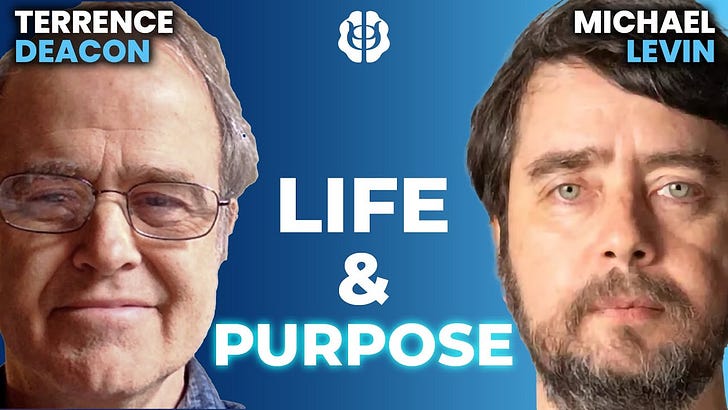Dialogues we are responding to include:
Michael Levin ⇄ Terrence Deacon on goal-directedness in biology:
Bernardo Kastrup ⇄ Jay Garfield on Madhyamaka Buddhism vs. analytic idealism:
Rupert Sheldrake ⇄ Mark Vernon on law-like habits and spiritual science:
Sean Kelly ⇄ Luke Johnson on Hegel, Jung and the psyche (which was mentioned early on but unfortunately we didn’t get to yet!):
Some reflections amplifying key points in my dialogue with Tim:
Philosophizing should keep its eye on the prize: attending to human existence and the suffering that comes from being embodied and crowded together in space (“crowded space” being the literal meaning of Duḥkha). Metaphysics must stay soteriological; it ought to help us suffer less rather than spiral into abstraction olympics. Whenever dialogue turns into an oppositional contest of right view versus wrong view, I worry we lose sight of this healing aim.
The path away from weaponized debate is translational thinking. Instead of locking language in private dictionaries, I try to meet difference in a productive way, translating another’s phrasing into my own idiom and offering it back so our frameworks might mutually evolve. Language is an artistic medium and a commons; even the crispest logic still relies on metaphor. If we forget this, we slide into misplaced concreteness, mistaking abstractions for reality and reifying whatever vocabulary flatters our position.
Variation already implies something invariant, a background that lets differences register as different. Whitehead speaks to that polarity when he pairs Creativity with the Primordial Nature of God, who envisages the order of what otherwise remains an infinite multiplicity of potentiality. Without something stable, the very idea of change becomes nonsensical; similarly, without the continual ingress of novelty this stability would be devoid of meaning. I see the same rhythm in biological life. Genes compress the hard-won lessons of past organisms, but development decompresses them in real time. Every thought becomes a microcosmic embryogenesis, to paraphrase Deacon, improvising from undifferentiated hunch toward determinate articulation. What we inherit is real potentiality, food that must be digested afresh in the present, not a deterministic script that seals our fate.
Ideas may have eternal beginnings but they also become historical creatures. Study of their histories of ingression inoculates us against reification—against crystalizing concepts into dogmas or worshiping scientific models as idols. Philosophers serve as critics of abstractions, guarding both common sense and imagination from reductionist temptations. We remind science that its power lies in mapping experience, not replacing it, and we remind religion that ultimate reality cannot be captured in any book.
The past is always present but as potential. The past is not, pace Laplace, an unbroken chain determining what is actualized in the present. There are gaps everywhere into which new possibilities can flow. I try to wield concepts lightly, translate generously, and judge metaphysics pragmatically by the creative release it affords and by the subtle easing of suffering it makes possible.
Timestamps (links take you to the YouTube version):
02:00 Today’s Agenda: Four Big Dialogues
04:15 Metaphysics & Alleviating Suffering
08:10 Debate vs Dialogue (Garfield · Kastrup)
12:45 Translational vs Oppositional Thinking
16:40 Variation, Invariance & Creativity
22:30 Ocean–Wave Metaphor & Animism
28:20 Light, Vision & Least-Action Musings
35:40 Process Cosmology & Creativity
42:55 Consciousness & the “Hard Problem”
50:30 History of Ideas & False Problems
57:40 Mechanical Philosophy Critiqued
01:05:30 Language, Models & Misplaced Concreteness
01:13:25 Socrates, Buddhism & Soteriology
01:21:55 Whitehead vs Laplace Determinism
01:30:40 Information, Entropy & Meaning
01:39:45 Prelude to Deacon–Levin: Goals & Teleology
01:47:30 Deacon – Levin on Goal-Directedness
01:54:30 Information vs Entropy (Shannon · Wiener)
02:01:00 Simondon: Information as Constraint & Selection
02:09:00 Variation, Stochasticity & Abduction
02:17:00 Laplacian Determinism & Indeterminacy
02:25:30 Whitehead, Past Immortality & Evolution
02:34:00 Cosmogenesis: Simplicity vs Infinity
02:42:00 Constructive Course-Graining & Identity
02:51:00 Genes, Epigenetics & Developmental Constraint
03:00:00 Lineages, Individuals & Open-Ended Evolution
03:09:00 Closing Reflections















Share this post